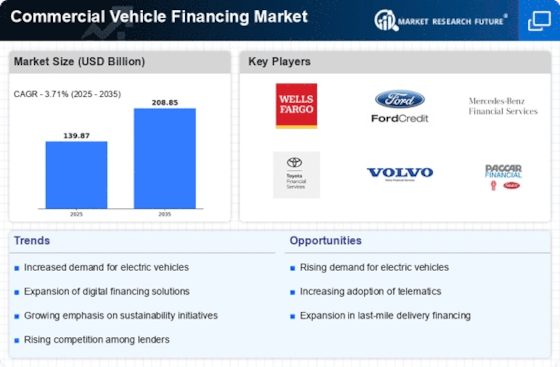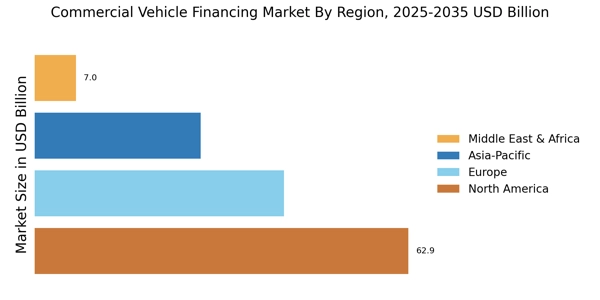Government Initiatives and Incentives
Government initiatives aimed at promoting the use of commercial vehicles play a crucial role in the Commercial Vehicle Financing Market. Various countries have introduced incentives such as tax breaks, subsidies, and grants to encourage businesses to invest in new vehicles. These initiatives not only stimulate demand for commercial vehicles but also enhance the attractiveness of financing options available to businesses. For instance, in 2025, it is estimated that government incentives could account for up to 15% of the total financing volume in the market. This support from governments is likely to foster growth in the Commercial Vehicle Financing Market.
Rising Fuel Prices and Operational Costs
Rising fuel prices and operational costs are compelling businesses to reassess their vehicle financing strategies within the Commercial Vehicle Financing Market. As fuel prices fluctuate, companies are increasingly looking for financing options that allow them to invest in more fuel-efficient vehicles. This trend is expected to lead to a 7% increase in financing for energy-efficient commercial vehicles by 2026. Businesses are recognizing that investing in modern, fuel-efficient fleets can mitigate rising operational costs, thus driving demand for tailored financing solutions in the Commercial Vehicle Financing Market.
Expansion of Ride-Sharing and Mobility Services
The expansion of ride-sharing and mobility services is reshaping the landscape of the Commercial Vehicle Financing Market. As companies like Uber and Lyft continue to grow, there is a corresponding increase in demand for vehicles that can be used for these services. This trend is likely to result in a 6% increase in financing requests for commercial vehicles specifically designed for ride-sharing purposes by 2026. The need for flexible financing solutions that cater to the unique requirements of mobility services is becoming increasingly apparent, thereby influencing the Commercial Vehicle Financing Market.
Technological Advancements in Vehicle Manufacturing
Technological advancements in vehicle manufacturing are significantly influencing the Commercial Vehicle Financing Market. Innovations such as electric and hybrid vehicles are becoming more prevalent, prompting businesses to seek financing for these new technologies. The shift towards more fuel-efficient and environmentally friendly vehicles is expected to drive a 10% increase in financing requests for commercial vehicles by 2026. As manufacturers continue to develop advanced features, the demand for financing solutions that accommodate these innovations is likely to rise, thereby impacting the Commercial Vehicle Financing Market positively.
Increasing Demand for E-commerce and Logistics Services
The rise in e-commerce and logistics services is a pivotal driver for the Commercial Vehicle Financing Market. As online shopping continues to expand, businesses require a robust fleet of commercial vehicles to meet delivery demands. This trend has led to an increased need for financing solutions tailored to logistics companies. In 2025, the demand for commercial vehicles is projected to grow by approximately 5% annually, indicating a strong market for financing options. Companies are increasingly seeking flexible financing arrangements to acquire vehicles that can support their operational needs, thereby propelling the Commercial Vehicle Financing Market forward.

















